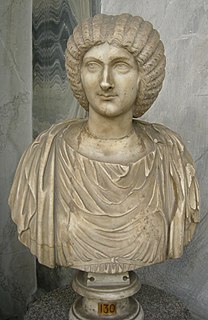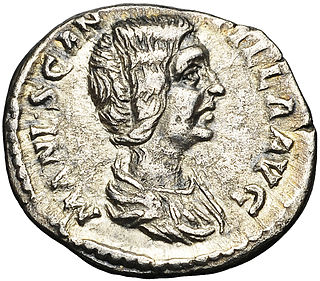This page is based on this
Wikipedia article Text is available under the
CC BY-SA 4.0 license; additional terms may apply.
Images, videos and audio are available under their respective licenses.
The 190s decade ran from January 1, 190, to December 31, 199.

Year 193 (CXCIII) was a common year starting on Monday of the Julian calendar. At the time, it was known as the Year of the Consulship of Sosius and Ericius. The denomination 193 for this year has been used since the early medieval period, when the Anno Domini calendar era became the prevalent method in Europe for naming years.

Pescennius Niger was Roman Emperor from 193 to 194 during the Year of the Five Emperors. He claimed the imperial throne in response to the murder of Pertinax and the elevation of Didius Julianus, but was defeated by a rival claimant, Septimius Severus, and killed while attempting to flee from Antioch.

Clodius Albinus was a Roman usurper who was proclaimed emperor by the legions in Britain and Hispania after the murder of Pertinax in 193, and who proclaimed himself emperor again in 196, before his final defeat the following year.

Julia Domna was a Roman empress of Arab origin, the second wife of Septimius Severus. She was born in Emesa in the Roman province of Syria, into a family of priests of the deity Elagabalus.

The Battle of Nicaea was fought in 193 between the forces of Septimius Severus and his eastern rival, Pescennius Niger. It took place at Nicaea in Asia Minor. Severus defeated his rival, and ended his bid for the Roman Empire the next year at Issus.
The Battle of Cyzicus was fought in 193 between the forces of Septimius Severus and his rival for the empire, Pescennius Niger, who was defeated.
The Year of the Five Emperors refers to the year 193 AD, in which the five claimants for the title of Roman Emperor were: Pertinax, Didius Julianus, Pescennius Niger, Clodius Albinus, and Septimius Severus. This year started a period of civil war when multiple rulers vied for the chance to become Caesar.
Anthony Richard Birley is a British ancient historian, archaeologist and academic. He was the Professor of Ancient History at the University of Manchester (1974–1990) and at University of Düsseldorf (1990–2002). He is the son of the archaeologist Eric Birley, who bought the house next to Vindolanda where Anthony and his brother Robin began to excavate the site. They have both taken part in many of the excavations there, and Robin now runs them. He was educated at Clifton College, 1950–1955; Magdalen College, Oxford, 1956–1963 : BA, 1st cl. Hons., 1960;

Manlia Scantilla was a Roman woman who lived in the second century. She was very briefly Roman Empress as wife to the Roman Emperor Didius Julianus. Her name indicates that she was born into the gens Manlia, which if correct, indicates an illustrious patrician ancestry.
Quintus Aemilius Laetus was a prefect of the Roman imperial bodyguard, known as the Praetorian Guard, from 191 until his death in 193. He acceded to this position upon the deaths of his predecessors Regillus and Julius Julianus, by appointment of emperor Commodus. His name suggests that his family received Roman citizenship from Marcus Aemilius Lepidus.
Marcus Peducaeus Plautius Quintillus was a Roman noble closely related by birth, adoption, and marriage to the Nerva-Antonine emperors. Through his marriage to Fadilla, the daughter of Emperor Marcus Aurelius and Empress Faustina the Younger, he became the brother-in-law to the future emperor, Commodus. Despite his position, he never became emperor himself. After Commodus was assassinated in 192, he fell out of favor with Septimus Severus during the Year of the Five Emperors. In 205, he committed suicide after Septimus issued an order for his execution.
Tiberius Claudius Severus Proculus was a Roman Senator. Via his mother he was a grandson of Emperor Marcus Aurelius, but he played only a limited role in dynastic politics.
Marcus Silius Messala was a Roman politician, senator and suffect consul towards the end of the 2nd century. In 193, Messala was the suffect consul from May until June. He was in command of the location where the murder of Pertinax took place. Septimius Severus accused Messala of murdering Pertinax and using his influence to convene and order the Senate to install the Senator Didius Julianus as Emperor. Septimius Severus called the death of Didius Julianus divine providence and ordered the execution of Messala.
Titus Flavius Claudius Sulpicianus was a Roman statesman who served as Senator and Consul suffectus. He unsuccessfully attempted to succeed his son-in-law Pertinax as Emperor in 193.
Gaius Pomponius Bassus Terentianus was a Roman military officer and senator who was appointed suffect consul in around AD 193.
Paccia Marciana was the first wife of Septimius Severus, who later became Roman emperor. They married around 175 and she died of natural causes around 186.







